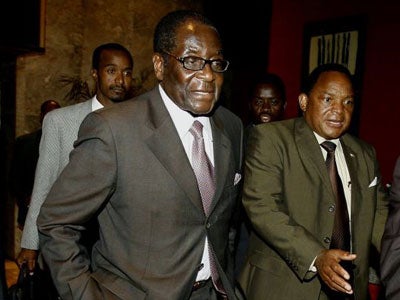Your support helps us to tell the story
From reproductive rights to climate change to Big Tech, The Independent is on the ground when the story is developing. Whether it's investigating the financials of Elon Musk's pro-Trump PAC or producing our latest documentary, 'The A Word', which shines a light on the American women fighting for reproductive rights, we know how important it is to parse out the facts from the messaging.
At such a critical moment in US history, we need reporters on the ground. Your donation allows us to keep sending journalists to speak to both sides of the story.
The Independent is trusted by Americans across the entire political spectrum. And unlike many other quality news outlets, we choose not to lock Americans out of our reporting and analysis with paywalls. We believe quality journalism should be available to everyone, paid for by those who can afford it.
Your support makes all the difference.Zimbabwe's main opposition MDC said on Wednesday plans by President Robert Mugabe's government to convene parliament would endanger power-sharing talks between the country's political rivals.
The political deadlock over who will control the government has hindered efforts to ease Zimbabwe's economic crisis. The government said on Tuesday it planned to convene parliament and swear in deputies elected in March 29 polls early next week.
But MDC Secretary-General Tendai Biti said in a statement that if parliament was convened, it would be against a framework agreement governing the power-sharing talks which began nearly a month ago and which could end Zimbabwe's deep political crisis.
"Any decision to convene parliament will be a clear repudiation of the Memorandum of Understanding, and an indication beyond reasonable doubt of ZANU-PF's unwillingness to continue to be part of the talks. In short convening parliament decapitates the dialogue," Biti's statement said.
In March elections, ZANU-PF lost its parliamentary majority for the first time since independence from Britain in 1980, but Morgan Tsvanigrai's MDC did not win an overall majority either.
The balance of power rests in the hands of a breakaway opposition faction led by Arthur Mutambara.
He has moved closer to Mugabe in recent weeks and any deal between them could weaken Tsvangirai, Zimbabwe's most powerful opposition leader, and add to political uncertainty.
The MDC initially said on Tuesday it had no objection to the opening of parliament but would reject any moves by Mugabe to appoint a cabinet before any power-sharing deal is reached.
Zimbabwe's Justice Minister Patrick Chinamasa, ZANU-PF's chief negotiator in the talks, said: "Yesterday, they said they had no problem with parliament opening, and today they have a problem? I have no comment on that."
Negotiations began last month after Mugabe was re-elected unopposed in June, in a vote condemned around the world and boycotted by Tsvangirai because of attacks on his supporters.
Crisis
Inflation rocketed to a staggering 11 million percent in June, the world's highest by far, from 2.2 million in May, and chronic food, fuel and foreign currency shortages are worsening.
Zimbabweans hope for a new leadership that can find a quick way to tame price growth and ease hardships that have driven millions out of the country and strained regional economies.
Tsvangirai's MDC challenges Mugabe's legitimacy, but under Zimbabwean law, parliament is convened and officially opened by the state president.
The issue of who will run the government is a major obstacle to an agreement, and there are no guarantees that a deal will bring reconciliation and long-term stability.
MDC officials fear Mugabe is manoeuvring to give Tsvangirai only a few ministries.
Southern African heads of state at a regional summit in Johannesburg over the weekend failed to push ZANU-PF and the MDC into an agreement.

Join our commenting forum
Join thought-provoking conversations, follow other Independent readers and see their replies
Comments